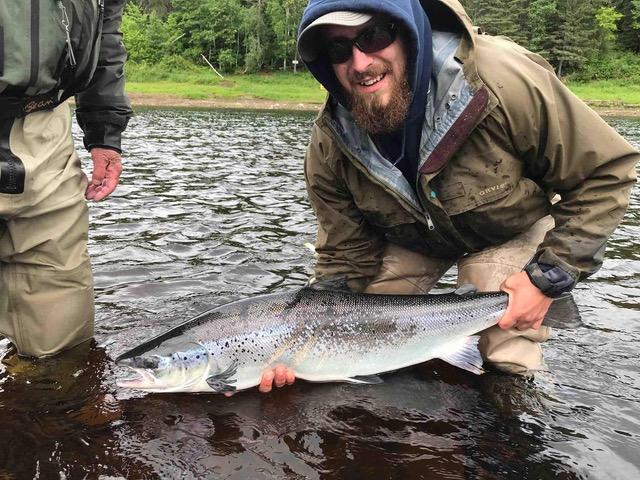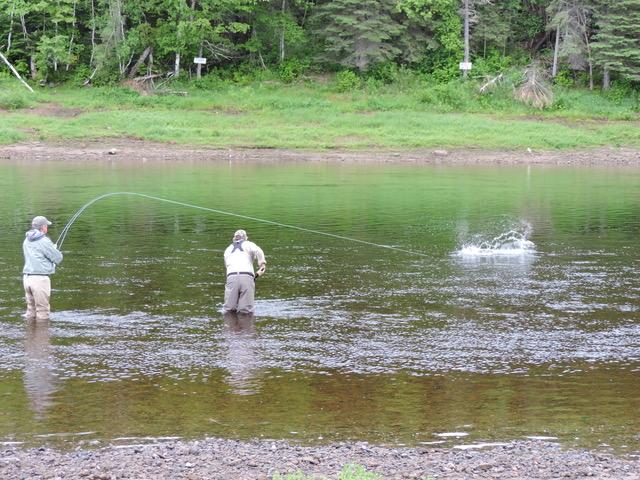Today the salmon, and those who depend on it for their living, are in crisis. Striped bass populations have exploded with the undesired side effect of swallowing up young salmon. The Miramichi Salmon Association Inc. (MSA) is taking steps to raise awareness about the risks to New Brunswick salmon populations.
“We need to get the ecosystem in balance. Predatory bass have exploded from 50,000 fish 10 years ago to over 1 million today. At the same time wild Atlantic salmon populations are in crisis and at historic lows. Twelve years ago transmitters on young salmon smolt confirmed 70% were making the successful journey to sea from the Miramichi. Today preliminary data results for this year indicate that less than 25% are making it to sea. We need action from DFO before we lose the salmon completely on the Miramichi. It’s that serious.” says Mark Hambrook, MSA President.
“We are still waiting for our permits from DFO to assess stomach contents of bass to determine the impact on wild Atlantic salmon as many are now spending their summers in the river instead of going back to the ocean,” continues Hambrook. “We know Eel Ground and other First Nations along the river have asked for an increase in bass quota to establish a commercial fishery. This would be a win-win-win for First Nations, camp owners who have operated for generations along the river and most of all, our wild Atlantic salmon populations.”
Guides who have worked the river for 70 years have seen nothing like it. Mervin Green is one of them. “It is a crisis. Bass are a warm water fish and for the first time in my 70 years on the river, bass have migrated 80 miles north from the estuary. We’re seeing pools of 100 where there used to be salmon. We haven’t seen any salmon parr since the bass arrived.” There are reports of schools of bass so thick they are getting caught in propellers of boats.
Seventeen camp owners have rallied and are appealing to Fisheries and Oceans Minister Jonathan Wilkinson to act immediately.
“Collectively, these camps represent hundreds, if not thousands, of jobs for residents along the river. Today, we are in serious peril of losing all of this, a result that will have a costly economic impact to the Miramichi Valley and the Province,” the camp owners write.
“The problem is the uncontrolled explosion of the striped bass population, which is consuming substantial percentages of juvenile Atlantic salmon at a time when the salmon populations are already depressed. While we recognize that striped bass is an indigenous species, the population is extremely high and it can be controlled to give salmon a fighting chance. They need that chance,” the letter explains.
The camp owners are asking for immediate action on 5 measures to save salmon populations from predatory bass:
- Keep the striped bass fishery open from April 15 to October 15 in non-tidal water and until October 31 in tidal water
- Substantially increase the daily bag limit to 6 fish and allow two days possession limit
- Change the slot size restriction to anything greater than 50 cm
- Work with the First Nations to allow them unlimited catch of striped bass in their pound nets and allow them to commercially sell the bass
- No size restrictions for bass retention in fresh water (non-tidal)
About the Miramichi Salmon Association Inc.
Since 1953, the MSA and its members have directed their capabilities and their funds to the protection of the entire Miramichi River system. Managed by volunteers from Canada, the USA and abroad, as officers and directors, the MSA remains cooperative with, but independent of, government or special interests influence. It responds in the end only to its growing conservation membership.
For 65 years, the MSA has watched over the Miramichi as a champion of conservation on behalf of anglers, outfitters, guides and all others with economic, environmental and recreational interests in the river. The net result is a well-managed river system that today, thanks in part to the MSA’s championing of its cause, has more miles of salmon angling water and traditionally holds larger and healthier populations of Atlantic salmon than most salmon rivers in North America.


